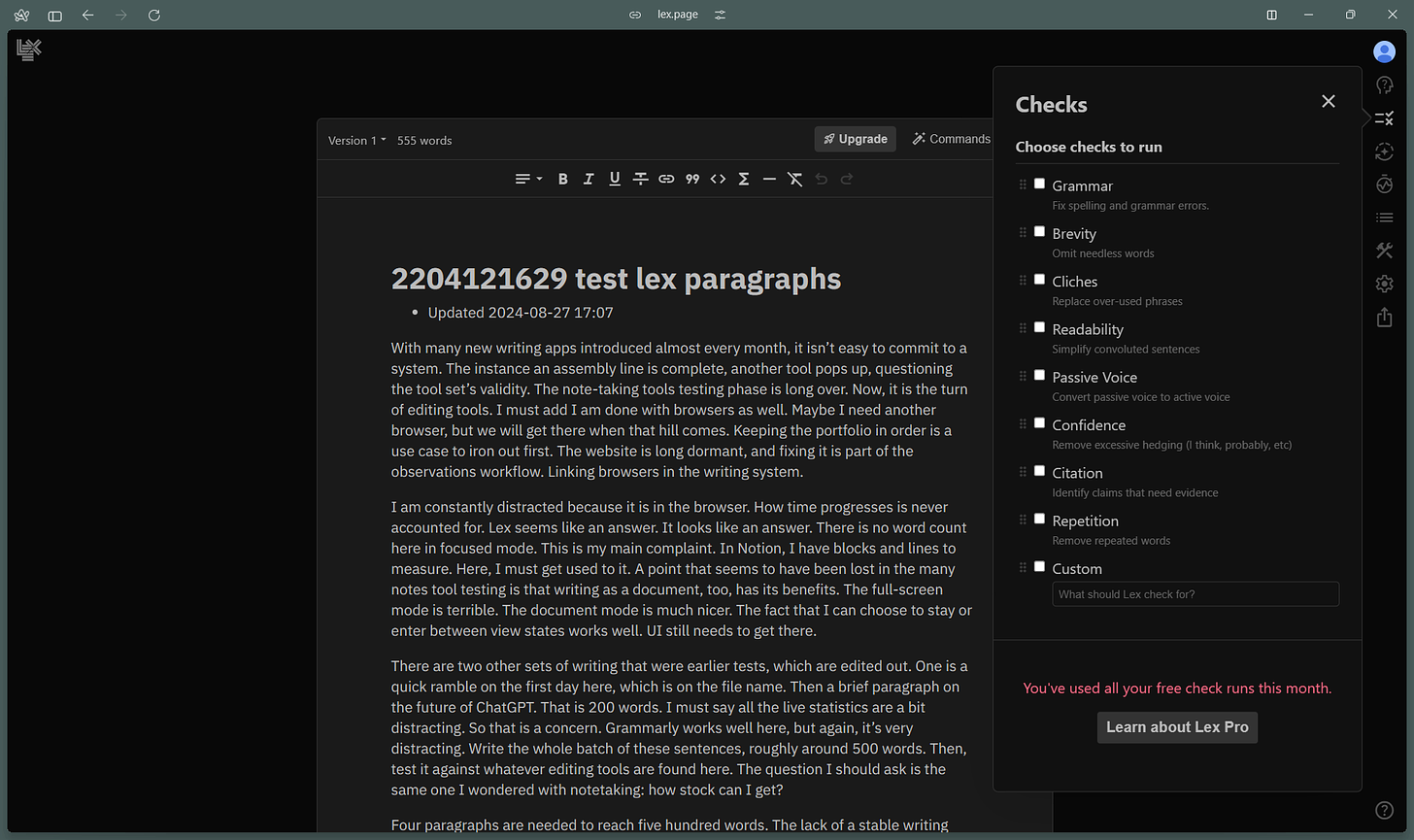2204121629 test lex paragraphs
hopefully the last writing app I try out and the pipeline will be whole again
With many new writing apps introduced almost every month, it isn’t easy to commit to a system. The instance an assembly line is complete, another tool pops up, questioning the tool set’s validity. The note-taking tools testing phase is long over. Now, it is the turn of editing tools. I must add I am done with browsers as well. Maybe I need another browser, but we will get there when that hill comes. Keeping the portfolio in order is a use case to iron out first. The website is long dormant, and fixing it is part of the observations workflow. Linking browsers together is essential to the writing system.
While writing, I am constantly distracted because it is in the browser. How time progresses is never accounted for. Lex seems like an answer. It looks like an answer. There is no word count here in focused mode. This is my main complaint. In Notion, I have blocks and lines to measure. Here, I must get used to it. A point that seems to have been lost in the many notes tool testing is that writing as a document, too, has its benefits. The full-screen mode is terrible. The document mode is much nicer. The fact that I can choose to stay or enter between view states works well. UI still needs to get there.
There are two other sets of writing that were earlier tests, which are edited out. One is a quick ramble on the first day here, which is on the file name. Then a brief paragraph on the future of ChatGPT. That is 200 words. I must say all the live statistics are a bit distracting. So that is a concern. Grammarly works well here, but again, it’s very distracting. Write the whole batch of these sentences, roughly around 500 words. Then, test it against whatever editing tools are found here. The question I should ask is the same one I wondered with notetaking: how stock can I get?
Four paragraphs are needed to reach five hundred words. The lack of a stable writing workflow hinders the development of both habits and writing skills. I can also only try a limited number of free check runs. So, what is free here is very limited. This, I argue, is the problem everywhere in the lower-run apps. Writing this note as part of the review is not planned. Now that I have started it, it should get done. Like most of my writing sentences, I write until I reach a specific limit. From eleven random sentences, it has now reached a structured set of four or five paragraphs.
The biggest reason to consider Lex is the writing sessions and the activity tracker on the home page. Every assembly line is very personal. Do I need these features is a question to get to. Which is the most efficient grammar and editing tool set is a very urgent question to solve. Solve all those questions; only then can that assembly line take shape. Lex is made for internet writers by internet writers, almost like Roam Research was created for researchers. Even if it is abrupt, that is a thought to close with. The font set here is irritating. All of this IBM Plex Sans. The end.
Extra 2408282213: As a workflow, we are not used to working with co-pilots next to us. This is the problem with generative AI adoption. However, the potential for increased efficiency is significant. The difference is similar in principle when research moves from the structured library to a very messy, uncatalogued internet. If I had to work on this patch of text, ideally with an in-app bot, I would only edit, but I write because there are thoughts I need to record. This appendix is essential since the note, with scattered thoughts, is relatively unstructured.
The age of slowness has passed. The more posts pushed out, the better. Well-worked-out editing skills are learned in public. For those who remember, we spent much time linking and thinking. The book clubs were only meant for bidirectional thought. With Capacities making the feature now among its free offerings, the value of the discourse is long gone. Craft upskilling is not just a service to look out for; it’s necessary for this machine’s augmented internet. Even if Lex is great, where it fails is at pricing. For one feature, you pay 12$/ month. The more you use it, the more you will find value in shelling out $20 for the Microsoft bot, which works in all its apps.
Writing stats is a feature I like the most. It makes sense to track how much you have written in a day. My interest in the section also increases my curiosity to probe how I can collect all the words I write and also edit, automated outside the app. As seen with notes tools, as distributed they are the more work they become. A different app such as Lex even if better than Co-pilot will become inefficient for larger projects. Essay length edits work better here, but if 30 essays need compilation and a lot more processes, a bot in PowerPoint, Excel, and OneNote is of better value for money.




